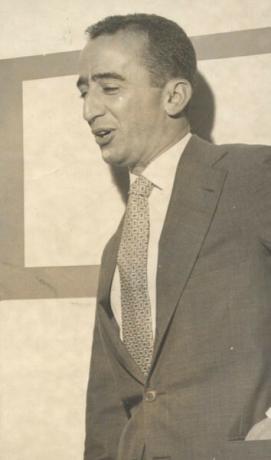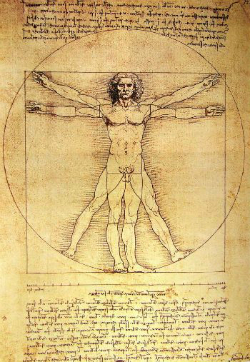Millôr Fernandes (or Milton Viola Fernandes) was born in the suburb of Rio de Janeiro, on August 16, 1923. Started working at approximately 14 years of age, in the magazine the cruise, while studying at the Liceu de Artes e Ofícios in Rio de Janeiro. He soon began writing for various periodicals and, in 1953, began his career as a playwright.
The author, who died on March 27, 2012, has dedicated most of his life to writing. Thus, it became identified with comedy, irony and criticism of manners. In addition to having memorable phrases, he produced plays that made history in Brazilian theater, such as freedom, freedom (co-authored with Flávio Rangel) and É..., one of the writer's most famous works.
Read too: Dramatic genre - texts written with the aim of being staged
Biography of Millôr Fernandes

Millôr Fernandes (or Milton Viola Fernandes) was born on August 16, 1923, in the suburb of Rio de Janeiro. However, he was only registered in 1924, as if he had been born on May 27th of that year. His father — Francisco Fernandes — was a Spanish-born Brazilian. However, he died in 1925, leaving the writer an orphan. So, to support the children, the mother was forced to work as a seamstress.
Millor started his school life in 1931 and, three years later, he fell in love with comic books. At that time, he was already showing his talent as a draftsman. However, in 1935, he also lost his mother to cancer. So the boy went to live with his maternal uncle's family.
Do not stop now... There's more after the advertising ;)
In 1938, the young Millôr entered the labor market, as office boy in a doctor's office and in the magazine the cruise, in addition to starting his studies at the Liceu de Artes e Ofícios in Rio de Janeiro. This year, was the winner in a contest of Tales of the magazine the cicada, where he went to work.
Next year, wrote to the Night Diaryand became director of magazines the cicada, the boy and Detective. As early as 1942, he made his first translation: the dragon's bloodline, by the American writer Pearl S. Buck (1892-1973). In 1943, he finished his studies at the Liceu and returned to the magazine the cruise.
Five years later, in 1948, the author traveled to the U.S, where he met Walt Disney (1901-1966). That same year, he married Wanda Rubino. As early as 1951, he took a trip through the Brazil, for forty-five days, in the company of writer Fernando Sabino (1923-2004), with the aim of getting to know the country better. In 1952, Millôr traveled to the Europe, met the Italy and then Israel.
The author's first play — a woman in three acts — premiered in 1953. From then on, he started a successful career in theater. Also hosted the television show University of Meier, on TV Itacolomi, in 1959. The following year, his play an elephant in chaos premiered after censorship. With her, Millôr Fernandes won the best author award from the Municipal Theater Commission.
The playwright and designer met the Egypt in 1961. Two years later, he was also in Portugal. That same year, he dropped out the cruise and went to work at Morning mail. In 1964, created the magazine Pif-Paf. In addition, he collaborated in several periodicals during his life, such as: The newspaper, Press Tribune, Look, The Quibbler, That is, Jornal do Brasil, The day, Sheet of S. Paul, butt and The State of S. Paul.
From the 1960s until his death, which occurred on March 27, 2012, in the South Zone of Rio de Janeiro, the theater was one of the artist's main means of expression, but he also participated in television programs.
At the beginning of his career, he used a pseudonym, but later he decided to take the name Millôr, because, on his birth certificate, the name Milton was left with the “t” without a line, placed over the letter “o”; the “n” was already missing a piece, hence the word “Millôr”.
Read too:Ariano Suassuna – playwright and creator of the Armorial Movement
Characteristics of Millôr Fernandes' work
Millôr Fernandes' texts, both prose and theater plays, are characterized by mood, often acid. THE irony is also present in his work, marked by a provocative spirit, which leads readers and theater audiences to reflect on reality and leave the comfort zone that we all resort to in our daily lives.
THE sociopolitical criticism is striking in his work, which also lends itself to reflection on human nature. In the theatrical text, in particular, the author moves between the customs criticism — something recurrent in his dramaturgy — and the political speech.
Finally, in addition to being known for his comedies about everyday life in Rio, the author also took the path of resistance theater, how the critic defines the show freedom, freedom, and by the call theater of the absurd, thus defined by the specialized critics, the play an elephant in chaos.
Works by Millôr Fernandes
![Book cover This is the true story of Paradise, by Millôr Fernandes, published by Companhia das Letras.[1]](/f/ef4abec32241c0afced6db444d370c0c.jpg)
→ Prose
Eve without a rib: a book in defense of man (1946)
time and setback (1949)
Lessons from an Ignorant (1963)
fabulous fables (1964)
This is the true story of Paradise (1972)
thirty years of myself (1972)
Millôr's Red Book of Thoughts (1973)
Imphantic Compositions (1975)
white book of humor (1975)
Devour me or decipher you (1976)
Millôr in the Pasquim (1977)
Painless reflections (1977)
Fabulous New Fables (1978)
What country is this? (1978)
every man is my hunt (1981)
New Republic Diary (1985-1988)
eros once (1987)
The cow went to the swamp or The cow went to the swamp (1988)
Ultimate Millôr: the bible of chaos (1994)
Critique of impure reason or The primacy of ignorance (2002)
100 fabulous fables (2003)
Presentations (2004)
New Fables & Fabulous Tales (2007)
circus of words (2007)
The world seen from here: Praça General Osório (2010)
The interview (2011)
→ Poetry
Papaverum Millôr (1967)
hai-kai (1968)
poems (1984)
→ theater
a woman in three acts (1953)
the size of a corpse (1955)
handsome as a god (1955)
Dialogue of the most perfect marital understanding (1955)
an elephant in chaos (1962)
Pif, tac, zig, pong (1962)
freedom, freedom (1965) |1|
Pygmalion (1965)
the immortal widow (1967)
compute, computer, compute (1972)
É... (1977)
the story is a story (1978)
Janio's orphans (1979)
the man from beginning to end (1982)
two boards and a passion (1982)
THE eternal fight between man and woman (1982)
kaos (1995)
See too:Oswald de Andrade – author who contributed to the reformulation of art in Brazil
Quotes by Millôr Fernandes
Next, we are going to read some sentences by Millôr Fernandes, taken from his book Ultimate Millôr — the bible of chaos.
“You can't write with 11 words what you can write with 10 (unless you're an American and earn per word; then the proposition must be inverted).”
"Every man is born original and dies plagiarism."
"And that's it."
“Abdomen: macho word meaning belly for both sexes. There should also be abdwoman.”
"The B is a l who fell in love with a 3."
"Giving honey does not make the bee superior."
"Aboriginal is the derogatory way the conquerors call the owner of the property."
"Only one thing fills everything—nothing."
"Not drinking is the addiction of abstinent."
"The worst vulture is despair."
"There is no problem so big that it doesn't fit the next day."
Note
|1| Written in co-authorship with Flávio Rangel (1934-1988), the piece can be considered a musical.
Image credit
[1] Company of Letters (reproduction)
by Warley Souza
Literature teacher

